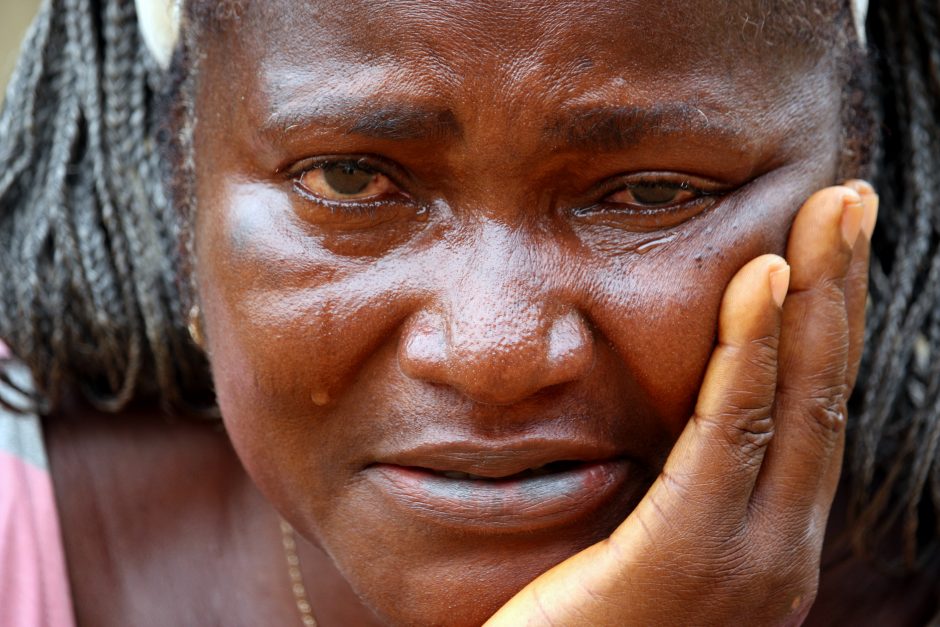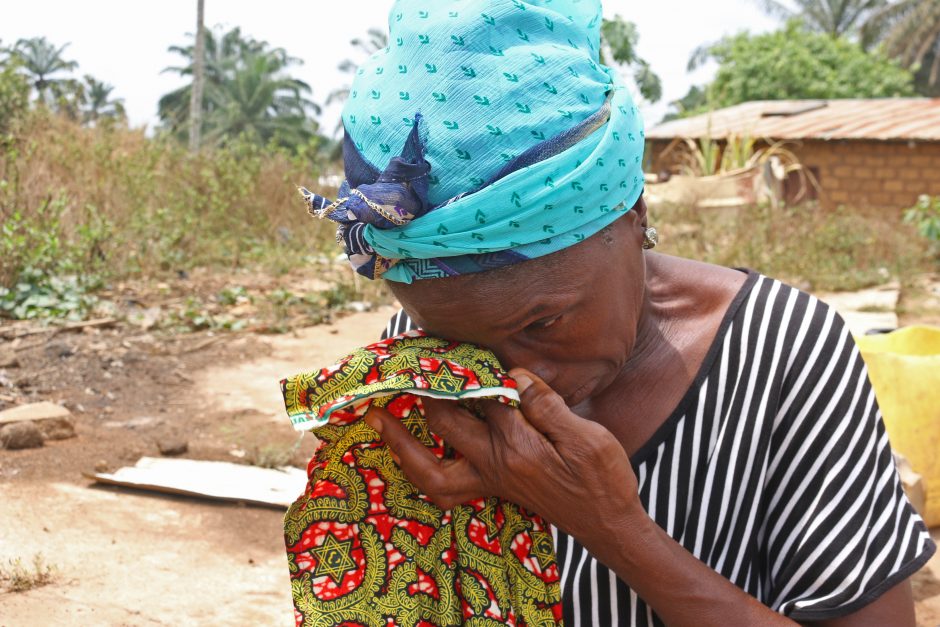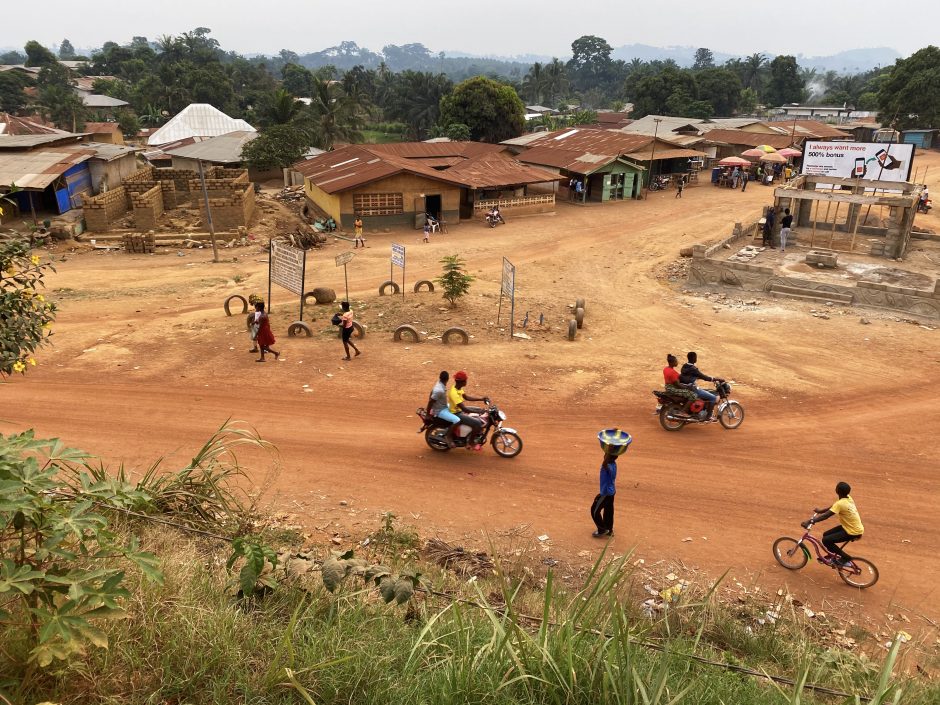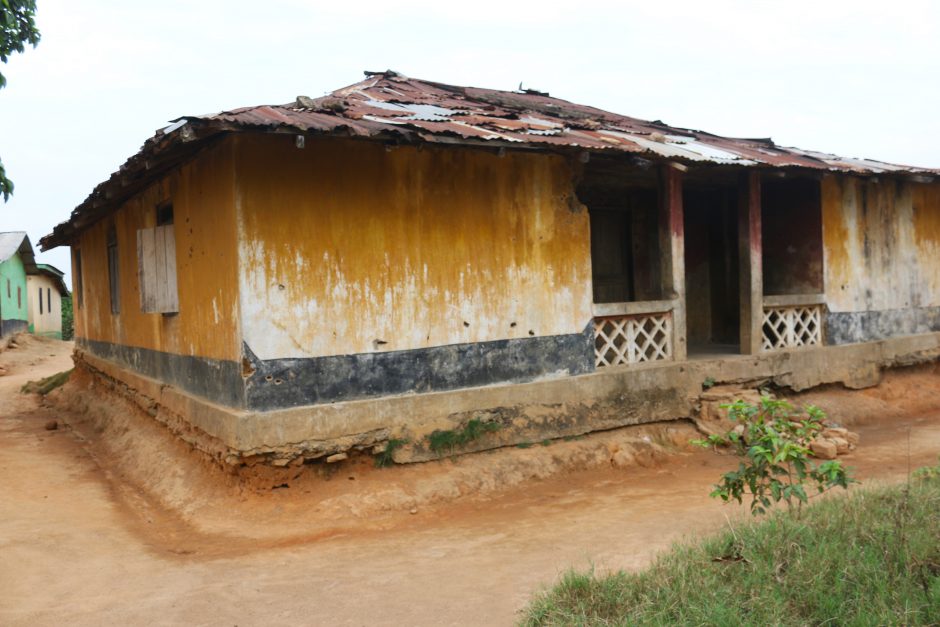FOYA DISTRICT, Lofa County, Liberia – In June 1993, rebels of the United Liberation Movement of Liberia for Democracy (ULIMO) overran this Kissi countryside and drove out their rivals, the National Patriotic Front of Liberia (NPFL). People fled for their lives into the forest. ULIMO fetched them out from their hideouts up to October of that year.
Tawa Tamba and her relatives were some of the first people the group captured, just after they spent three days in the bush.
ULIMO, under the command of a young rebel general named Alieu Kosiah in the district, ordered all civilians to gather at a roundabout in the middle of Foya City. From there, they lined them up along Broad Street. Then, the warring faction picked people they suspected of collaborating with the NPFL and killed them. Finda, Tamba’s elder sister, was pointed out as having a relationship with an NPFL soldier.
“When they pointed out someone, the ULIMO fighters would go to Kosiah, and he would tell them to kill the person,” Tamba says in an interview with FrontPage Africa at the exact place on the dirt street where she watched her sister targeted. “Kosiah gave the last order for them to kill my sister.”
Tamba’s sister, who had a baby strapped to her back, was stabbed and fell to the ground. Tamba wanted to run to help her sister and comfort the crying infant son, but all she could do was watch silently in horror.
“Kosiah gave the order for soldiers to check the nearby houses,” Tamba recalls. “Anyone you hear crying, kill the person.”
Kosiah and his men stayed in Foya until 1995. Two years later, He fled Liberia to Switzerland following the election of Charles Taylor—who led the NPFL—as president. Kosiah lived in that European country quietly with his permanent-resident status until November 2014. At that time, seven unidentified Liberian witnesses—some of whom come from Foya—filed a complaint against him.
Kosiah’s charges include the killing of 18 people, murder of a schoolteacher and eating his heart, sexual enslavement of a woman, recruitment of a 12-year-old boy to fight, and looting, among others.
Kosiah is the first accused Liberian war criminal to face trial for war crimes committed in the Liberian civil war. His war crimes trial, the first to be heard by a civilian court in Switzerland, finally started last week after being postponed four times due to the coronavirus pandemic—rescheduled from April to June, to August, to November, and then December 3.
On Friday, in the Federal Criminal Court in Bellinzona, Kosiah, 45, testified that he was a founding member of ULIMO. But he denied the charges, saying he was not in Lofa County at the time of the crimes.
Tamba wishes that Kosiah would get a death sentence. “I want him to be killed because he killed my sister,” Tamba says fighting back tears and rage. “The same thing that Kosiah did to my sister, let them do it to him.”
Tamba’s view is the same as most of the people in Foya interviewed by FrontPage Africa.
ULIMO, founded in May 1991 in Guinea by exiled Mandingoes and runaway soldiers of the Armed Forces of Liberia (AFL), fought the NPFL for control of the northern, central and western parts of the country. It committed 11,564 human rights violations throughout its existence (1991-1996), the fifth-most crimes recorded by the Truth and Reconciliation Commission (TRC). The commission barred Kosiah and 49 others from holding public office for 30 years.
Those three years it controlled Foya, ULIMO committed some of the worst atrocities in Liberia’s 14-year civil conflict. Some 150 victims are buried in a mass grave at the spot of a palaver-hut monument next to the Foya City Hall.
For survivors, Kosiah’s trial has evoked painful memories of the horror—tears and fury alike.

“If General Kosiah should be killed, [the killing] should start from his toes to his head,” says Hawa Nathaniel in the Kissi language. She watched her husband, Nathaniel Sumon, killed by ULIMO soldiers that she says were given the order by Kosiah. Like Tamba’s sister, Sumon had been summoned with other civilians for a town meeting that routinely became an execution. Young rebel commander Kosiah sat on the porch of a house owned by the legendary Chief Tamba Taylor and allegedly presided over the killings.
“[The rebels] poured a bucket of boiled water on his head,” Nathaniel recalls. “His skin began to peel gradually. When my daughter saw that, she ran to her father but was hit by a rebel with a gun every time she ran to him. The rebels continued to pour the boiled water on my husband’s head until his skin peeled.”

Sumon was killed not far from where Finda, Tawa’s sister, was stabbed to death. It is just a stone’s throw from Foya’s old police station, the setting of Foya’s bloodiest day under ULIMO. On Monday, June 28, 1993, fifteen men were called to the town roundabout and slaughtered after Kosiah and his men experienced huge casualties in a fierce gun battle with the NPFL for Gbarnga, Bong County, witnesses say. They call it “Black Monday.” Three of the victims were Thomas Borbor, Nyumah Salia and Saah Sondo.

Shortly after Black Monday, ULIMO killed nine other men, butchered their bodies, placed the pieces of their remains into a wheelbarrow with the tag “Meat for Sale,” and forced passersby to buy and eat them, several witnesses say.
That was the same fashion in which the rebels murdered Hallie Bowah, who was 26 at the time, and Saah Ndminin, a teacher with the Free Pentecostal Global Mission School.
“They grabbed him, knocked him down and cut his throat,” says Yarwah Bowah, Hallie’s sister, through an interpreter. She claims Kosiah gave the order. “When they cut throat, he ordered them to get axe and butcher him. When they got through butchering him, they cut him into pieces. After that, [Kosiah] ordered civilians to put pieces of the dead man’s remains in pans. They told the people to put the piece in the pan into a big drum and boiled it. When it was cooked, they gave it to people to eat.”
The rebels gave her some of the cooked parts of her brother to eat. She pretended to have eaten the horrific meal and threw it away as soon as they took their eyes off her. “I want them to kill [Kosiah] just how he killed my brother,” says Yarwah.
Ndiminin, on the other hand, was killed for telling a United Nations delegation that ULIMO fighters looted Foya Borma Hospital, the major health facility in the district.
“They tied him with wire. They cut here and put it in the pan. They cut here and put it in the pan,” says Mary Ndiminin, the victim’s widow, squeezing her arms and legs. Talata Sheriff, who went by the aliases “Ugly Boy” and “Saah Cway” (meaning “firstborn son with an axe” in the Kissi language), extracted her husband’s heart, cooked and ate it, she says.
Ndiminim’s husband was later buried along with other discarded bodies and body parts where the palaver-hut monument sits.
No Death Penalty for Kosiah
Kosiah does not face a death penalty because the Swiss Constitution forbids capital punishment. However, he faces a maximum 20-year sentence, which means he would be 65 after serving a full prison term.
The trial is being held under a 2011 Swiss law that ratified universal jurisdiction—a UN-backed legal doctrine that allows countries to try residents for crimes committed on foreign soil. Switzerland’s only other war crimes case was held in 2001 when a military court found Fulgence Niyonteze, a former Rwandan mayor, guilty for his role in the 1994 genocide in that country and sentence him to 14 years in prison.
Kosiah is the second ex-ULIMO general to be prosecuted in connection with the Liberian Civil war, which killed an estimated 250,000 people and displaced more than a million. The first was Mohammed Jabbateh, known as “Jungle Jabbah,” who is serving a 30-year sentence in Philadelphia, United States of America, for immigration fraud and perjury.

Many witnesses in the trials of Kosiah, Jabbateh and Kunti Kamara—another ex-ULIMO fighter arrested in France for alleged war crimes—come from Foya, which was ULIMO’s stronghold in Lofa County.
Hassan Bility heads the Global Justice and Research Project (GJRP), which works with Switzerland-based Civitas Maxima to gather evidence for the trials of Liberia’s accused war criminals. He is representing four of the seven plaintiffs in the Kosiah case and praises the bravery of the people of Foya.
“They’ve braved the storm. They’ve challenged everything. They’ve refused to be subjected to fears by suspected war criminals,” Bility says in an interview at GJRP headquarters in Montserrado. “And they’ve stood up. Now, most of the cases are coming out of Foya. And we want to also encourage Liberians where most of these crimes are being committed—other Liberians who reside in [other towns] or who were victims of many of these crimes—to stand up like Foya.”
This story was a collaboration with New Narratives as part of the West Africa Justice Reporting Project.
